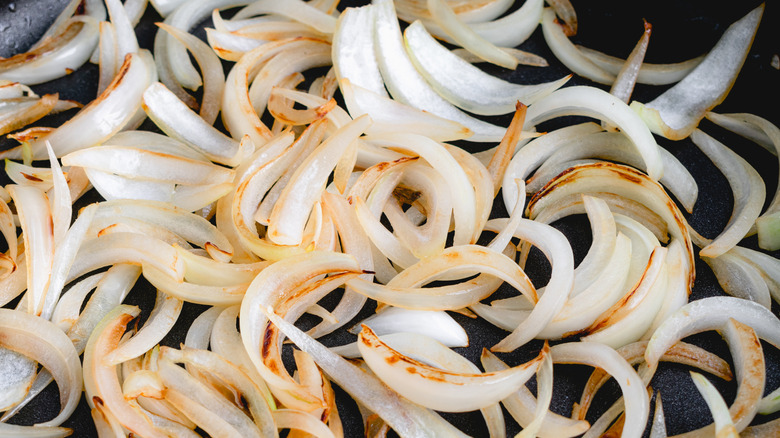For A Flavorful Soup Every Time, Pay Attention To The Onions
Planning on whipping up a big batch of veggie soup for dinner? Lucky for you, Tasting Table has a ton of yummy soup recipes to choose from. But whether you decide on a hearty minestrone, spicy black bean, or classic chicken noodle, there's one ingredient you'll want to take special care to prepare: the onions. A tear-inducing allium is not to be trifled with; indeed, it has the power to make or break any meal. That holds especially true for soup, a dish that really depends on achieving a harmony of flavors amidst different components. But here's the thing: Onions are as fickle as they are flavorful, and cooking them wrong (or in the wrong order) can throw everything off balance.
If you're including onions in your soup, you'll want to hold the acid until they're thoroughly cooked. Things like wine, tomatoes, lemon juice, or pickled veggies like kimchi all bring some acid to the party. Introducing that element too early will hinder the onion's cooking process by slowing the breakdown of pectin and cellulose, which help give onions their structure. The presence of acid will prevent onions from softening, leading to hard, floating pieces that rise to the top of your broth. It'll also stop them from developing their cooked flavor. Therefore, giving them time to sweat or sauté solo is essential if you're using them in soup.
The magic is in the Maillard reaction
Even if you're not planning to incorporate any tomatoes or wine into your soup, onions should not simply be tossed into the pot with everything else. Why? For one thing, they need high heat to fully develop their flavor. While raw onions certainly have their uses, their sharp and almost spicy taste isn't exactly conducive to complementing the other ingredients in your soup.
In order to bring out their sweet, earthy and somewhat nutty notes, you'll want them to experience the Maillard reaction, which leads to browning and that desired shift in taste. This chemical reaction, which happens when heat interacts with sugars and amino acids, starts to occur at around 285 degrees Fahrenheit. But water boils at 212 degrees Fahrenheit, the onions won't be able to achieve the reaction if they're added straight to your broth. In fact, many soup recipes involving veggies like onions, carrots, and/or celery will advise you to sauté them before pouring in the stock or mixing them with liquid. Let's just say that unless you want a soup full of crunchy or raw-tasting onions, cooking them thoroughly, sans any acid or liquid, should always be your first step.

